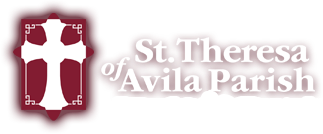Marriage
The Church has a rich tradition on sacramental marriage and covenantal union. The Old Testament authors write of God making a covenant with the chosen people and promising them that they will never be forsaken. The New Testament authors write of Jesus as the new covenant and compare the relationship of Jesus with the Church to the relationship of a husband and wife.
The matrimonial covenant, by which a man and a woman establish between themselves a partnership for the whole of life, is by its nature ordered toward the good of the spouses and the procreation and education of offspring.
Matrimony, or Marriage, like Holy Orders, is a sacrament that consecrates for a particular mission in building up the Church. It is seen as a sign of the love between Christ and the Church, which is established between spouses in a permanent and exclusive bond, sealed by God. The Sacrament gives couples the grace they need to attain holiness in their married life and for responsible acceptance and upbringing of their children.
The Catechism of the Catholic Church on Marriage:
1659
St. Paul said: "Husbands, love your wives, as Christ loved the Church . . . This is a great mystery, and I mean in reference to Christ and the Church" (Eph 5:25, 32).
1660
The marriage covenant, by which a man and a woman form with each other an intimate communion of life and love, has been founded and endowed with its own special laws by the Creator. By its very nature it is ordered to the good of the couple, as well as to the generation and education of children. Christ the Lord raised marriage between the baptized to the dignity of a sacrament (cf. CIC, can. 1055 § 1; cf. GS 48 § 1).
1661
The sacrament of Matrimony signifies the union of Christ and the Church. It gives spouses the grace to love each other with the love with which Christ has loved his Church; the grace of the sacrament thus perfects the human love of the spouses, strengthens their indissoluble unity, and sanctifies them on the way to eternal life (cf. Council of Trent: DS 1799).
1662
Marriage is based on the consent of the contracting parties, that is, on their will to give themselves, each to the other, mutually and definitively, in order to live a covenant of faithful and fruitful love.
1663
Since marriage establishes the couple in a public state of life in the Church, it is fitting that its celebration be public, in the framework of a liturgical celebration, before the priest (or a witness authorized by the Church), the witnesses, and the assembly of the faithful.
1664
Unity, indissolubility, and openness to fertility are essential to marriage. Polygamy is incompatible with the unity of marriage; divorce separates what God has joined together; the refusal of fertility turns married life away from its "supreme gift," the child (GS 50 §1).
1665
The remarriage of persons divorced from a living, lawful spouse contravenes the plan and law of God as taught by Christ. They are not separated from the Church, but they cannot receive Eucharistic communion. They will lead Christian lives especially by educating their children in the faith.
1666
The Christian home is the place where children receive the first proclamation of the faith. For this reason the family home is rightly called "the domestic church," a community of grace and prayer, a school of human virtues and of Christian charity.

